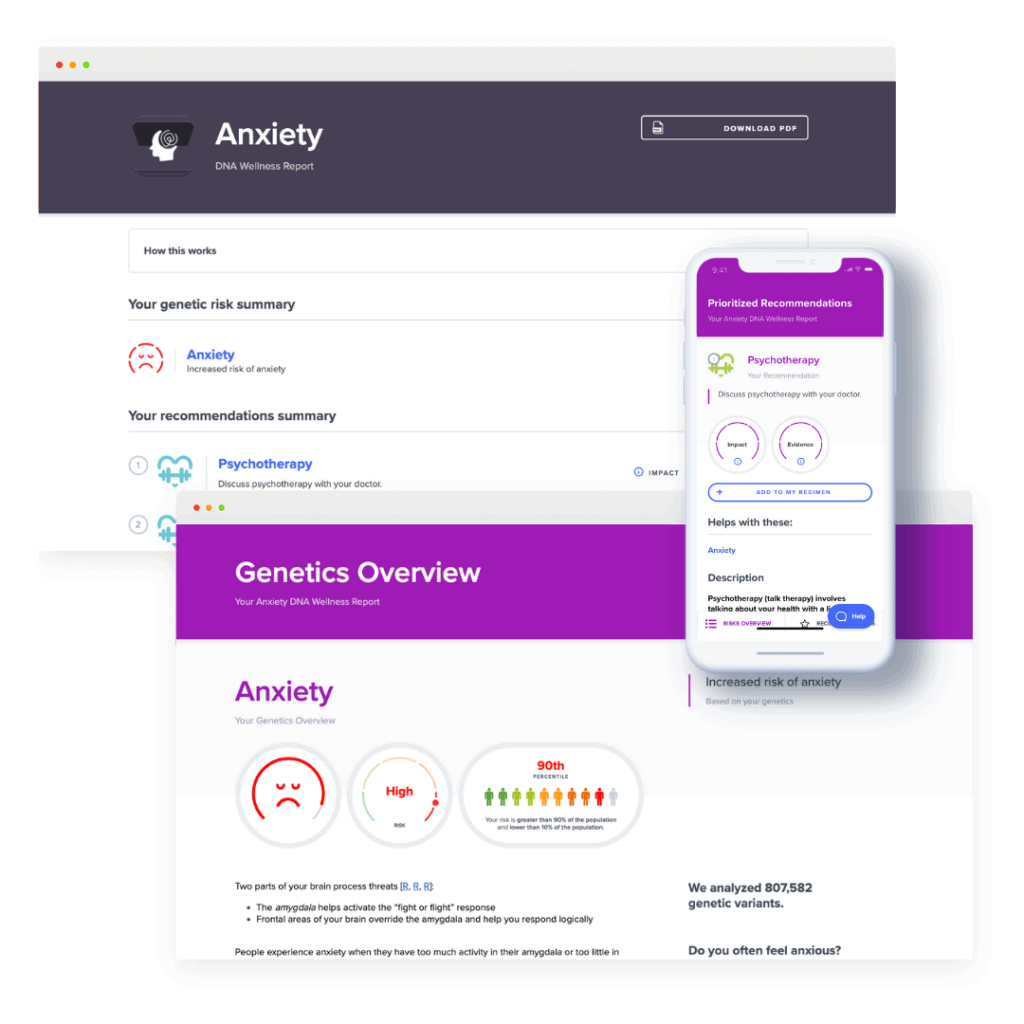Your genes don’t get the final say on your anxiety…
If you think about it, we live in the most amazing moment in time. We have access to millions of blogs, articles, and books written by credentialed experts on how to feel less anxious, all at our fingertips.
But even with all of that, a lot of us are still in the dark when addressing things like mood swings, irritability, and anxiety.
Here’s the REAL problem.
The internet is a great tool – but when it comes to anxiety, you won’t find much in terms of “science-backed” advice. Even conventional approaches only address the symptoms, without looking at a person’s health as a whole.
I’m not here to sell you on a magic “cure” for anxiety. That’s because one singular “cure” doesn’t exist. Everyone is unique, and what works for me, may not work for you. The differences in how we manage stress and anxiety go deeper, down to our DNA.
DNA and anxiety
First and foremost, let me explain the connection between anxiety and our genes in more detail.
For many, anxiety is thought of as something that “runs in the family”, which is actually partly true. About 30-67% of the differences in people’s chances of getting anxiety can be attributed to genetics, so if your mom has anxiety, it’s possible that you could develop it as well.
Therefore, it’s no surprise that companies started analyzing people’s DNA to find out exactly which genetic variants may be predisposing them to develop anxiety and more.
But not every DNA test is created equal. In fact, for many of them, you may be better off just Googling “How to improve my anxiety” and get your advice from a blog that states “Do your best” as one of their top anxiety-busting tips.
Let me be clear by saying that not ALL DNA companies are this way. Some of them are actually pretty accurate nowadays, and they give you a lot of information that you wouldn’t have known had you not taken a DNA test.
The reason why it’s important to do your research before you choose a DNA test for anxiety is that many of these DNA companies focus most of their budget on marketing – and science comes last.
Although some may have pretty advanced methods of analyzing DNA, their health recommendations are not personalized to each individual, effectively canceling out the DNA test in the first place.
But hey, at least you know where some of your ancestors originated from, right?
Your genes don’t get the final say.
For most of my life, I was sick. I was anxious. I didn’t know how to manage my stress, among other things. I asked for help, but the solutions from doctors, specialists, and health gurus never worked for me. After years of trying, I almost gave up hope.
But once I discovered that my genes predisposed me to a slew of health issues including anxiety, I also discovered that there were ways to offset this by changing my diet, lifestyle, and supplement regimen based on my unique DNA.
So yes, genetics may predispose you to develop anxiety, but your environment, stress levels, lifestyle, even your diet play a part, too.
Here are just some of the genetic variants associated with anxiety, and what changes you can make to offset them:
GABRG2 gene variant
This variant is associated with anxiety. It suppresses GABA, a neurotransmitter that calms the mind. Supplementing with purple passionflower may help increase GABA levels to offset this.
BDNF gene variant
BDNF is a crucial brain chemical, and this variant may reduce BDNF levels. Some people who have anxiety have lower BDNF levels, and relaxation techniques like yoga may improve mood and reduce stress by boosting BDNF levels.
FAAH gene variant
This genetic variant is also linked to anxiety. It likely increases FAAH, an enzyme that reduces cannabinoid levels. CBD may help by inhibiting FAAH.
This is just a small part of what DNA tells us about our health – and SelfDecode’s Anxiety report analyzes over 800,000 genetic variants alone! Your health recommendations are unique too – because they are made based on your DNA.

Most DNA companies analyze only a handful of the most common genetic variants and then provide a generalized list of health recommendations that work for “most” people.
And you know what? That’s just not good enough.
Science ALWAYS comes first for SelfDecode. We’re now analyzing over 83 MILLION genetic variants in total, while other companies are still under 1 million or less.
For each DNA report, we’re analyzing an average of almost a million or more variants, while our competitors (pictured below) are stopping at 1 or 2 of the most common genetic variants associated with any given health condition.
The whole idea of using your DNA to improve your health should be based on the FULLEST picture of your health possible. You simply can’t get that by only looking at one or two genes – it’s as useful as reading the first page of a book and writing a synopsis based on that one page alone.
How is SelfDecode different from the others?
Because what we’re doing is difficult and expensive.
It’s a real science and engineering feat to build the most advanced DNA analysis tool and provide personalized health recommendations based on the user’s DNA.
It takes some really smart, talented (and expensive) people to do that.
In order to give you the most accurate results and personalized recommendations based on your genes, we’re using the latest techniques in AI, including deep learning, bayesian machine learning, and hyperdimensional computing for genetic imputation and our genetic models.
So, while everyone else is taking the easy way out to make an extra dollar off of consumers that aren’t able to confirm how accurate the reports really are…
We’ll be over here providing REAL personalized health.
Can you conquer anxiety with genetics?
If you’re serious about improving your health starting with conquering anxiety, there are a lot of different ways to address it with today’s technology. We have a wealth of information in the palm of our hands – the trick is to start by researching the right things.
My health journey began when I started looking at my DNA, and only then was I able to find the root cause of my anxiety. If I had known what was right for my body from the beginning, I probably would’ve saved a lot of time spent being sick, anxious, and stressed.
You can find out if your genes are predisposing you to anxiety with your own personalized DNA Anxiety Report by clicking here. See you on the other side!







